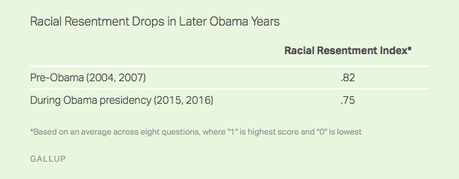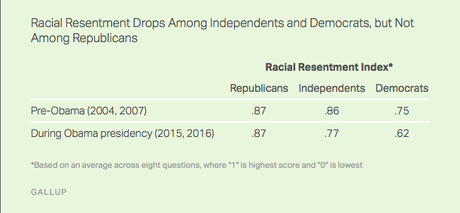

The charts above are from the Gallup Poll. Here is Gallup's explanation of how they reached the numbers displayed in their charts:
Our review found eight questions that were asked in 2004 and 2007 -- before Obama -- and then again in 2015 and 2016 -- during the Obama years. These questions, combined, provide what we believe is a reasonable measure of racial resentment. Analyzing responses from the two earlier surveys and comparing those with the responses from the two later surveys provides the needed divide between pre-Obama and Obama-era attitudes.
The questions are as follows:
- In general, do you think that blacks have as good a chance as whites in your community to get any kind of job for which they are qualified, or don't you think they have as good a chance?
- In general, do you think that black children have as good a chance as white children in your community to get a good education, or don't you think they have as good a chance?
- Again, in general, do you think that blacks have as good a chance as whites in your community to get any housing they can afford, or don't you think they have as good a chance?
- Just your impression, are blacks in your community treated less fairly than whites in the following situations?
- On the job/At work
- In neighborhood shops
- In stores downtown/In the shopping mall
- In restaurants/bars/theaters/other entertainment places
- In dealing with the police, such as traffic incidents
We looked only at respondents who identified their race as white. The racially resentful answer to each question is the one where the respondent does not believe blacks are treated unfairly and/or that they do have equal opportunities. The interpretation of these responses as racially resentful derives from other scholarly research in this area. Whites who say that blacks have as good a chance as whites to get jobs, schooling and housing, and who think blacks are treated just as fairly as whites across the list of five situations are racially unsympathetic. If racial resentment rose during the Obama years, the assumption is that whites would have become less sympathetic about blacks' situation in American society -- or, in other words, more racially resentful.
The analysis uses the mean of the eight items to construct a racial resentment scale that gives a score to each respondent. The top overall score of "1" means the person answered in the unsympathetic, resentful direction on all eight questions, and "0" means they answered all eight in the other direction.
The charts show that the Obama administration did have an effect on racism among whites in this country. Racism dropped among whites in the general population, among Independents, and among Democrats. The only group that did not show a drop in racist attitudes was Republicans.
It is good that racism dropped, but it didn't drop nearly enough. In a country that claims to offer equal rights and opportunity to all races and ethnicities, the racist index show be close to 0.0. But it isn't. In fact, it is above 0.5 for all groups (including Democrats).
That shows that racism is still a big problem in the United States -- and any claim to the contrary is delusional.



